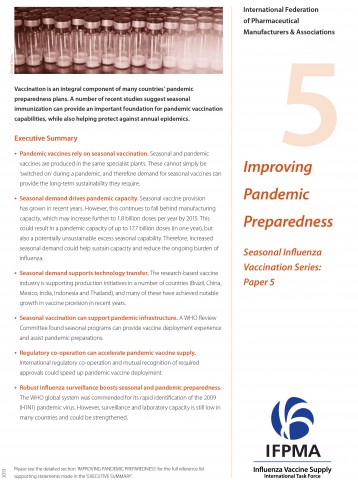126th Session of the WHO Executive Board Agenda Item 4.1: Pandemic influenza preparedness: sharing of influenza viruses and access to vaccines and other benefits
Delivered by Eduardo Pisani – check against delivery
Mr Chairman, Madam Director General, distinguished members of the Executive Board, Excellencies, ladies and gentlemen,
As new Director General of the International Federation of Pharmaceutical Manufacturers and Associations, I am grateful for this opportunity to submit the perspective of the research-based pharmaceutical and vaccine manufacturers on this important agenda item.
“When the history of this pandemic is written, the speed of actions taken by governments will earn the highest marks”, stated Dr. Chan in her opening remarks two days ago.
The global response to the current H1N1 pandemic demonstrates that, under the leadership of the WHO, international organizations, Member States and manufacturers can work together collaboratively to address public health emergencies quickly and effectively.
Manufacturers were invited to join forces in the pandemic preparedness efforts by the UN Secretary General and the WHO Director General on May 19, 2009, in this same room. And we delivered.
Years of research and development and over $4 billion of investment by influenza vaccine manufacturers, working closely with the WHO network, have led to the production of new and specifically tailored H1N1 vaccines, with the first regulatory approvals achieved only 3 months after the WHO’s pandemic declaration.
Since the pandemic declaration, IFPMA Members have made unprecedented voluntary contributions, including providing over 75% of the 200 million doses of influenza vaccines set as a target by WHO for vulnerable countries. In addition, some members are donating more than 12 million courses of antivirals, reserving production capacity for developing country supply and transferring elements of production for local manufacture in emerging countries. Several manufacturers have implemented tiered-pricing approaches, offering lower prices in developing countries. Paired with donations of vaccines and financial contributions from Member States, we, together, have mounted the most timely and comprehensive pandemic response the world has ever seen.
Looking to the future, further efforts could be explored to instill greater sustainability and predictability into this system. These efforts should build on the voluntary nature of the current system which is able to effectively respond to any unique set of circumstances which may arise. Such as a significant mutation of the virus which would require a new vaccine to be developed and produced. Other health emergencies are also managed through voluntary international collaboration, and there appears insufficient evidence to adopt an alternative approach to the established and effective system for pandemic influenza.
In summary, IFPMA firmly believes that any new global preparedness framework must be based on voluntary collaboration and a shared commitment to public health. We stand ready to play our part to ensure that the cooperation that has defined the global response to the first influenza pandemic of the 21st Century will continue and grow.
Geneva, January 20, 2010









